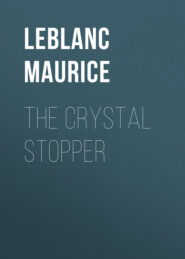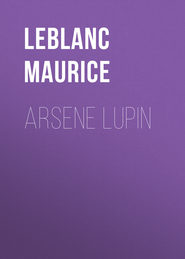По всем вопросам обращайтесь на: info@litportal.ru
(©) 2003-2025.
✖
The Extraordinary Adventures of Arsene Lupin, Gentleman-Burglar
Настройки чтения
Размер шрифта
Высота строк
Поля
“And the black pearl?” he murmured.
The box of letter-paper was in its place. He opened it, eagerly. The jewel-case was there, but it was empty.
“Fichtre!” he muttered. “You boasted of your good fortune much too soon, my friend Lupin. With the countess lying cold and dead, and the black pearl vanished, the situation is anything but pleasant. Get out of here as soon as you can, or you may get into serious trouble.”
Yet, he did not move.
“Get out of here? Yes, of course. Any person would, except Arsène Lupin. He has something better to do. Now, to proceed in an orderly way. At all events, you have a clear conscience. Let us suppose that you are the commissary of police and that you are proceeding to make an inquiry concerning this affair–Yes, but in order to do that, I require a clearer brain. Mine is muddled like a ragout.”
He tumbled into an armchair, with his clenched hands pressed against his burning forehead.
The murder of the avenue Hoche is one of those which have recently surprised and puzzled the Parisian public, and, certainly, I should never have mentioned the affair if the veil of mystery had not been removed by Arsène Lupin himself. No one knew the exact truth of the case.
Who did not know—from having met her in the Bois—the fair Léotine Zalti, the once-famous cantatrice, wife and widow of the Count d’Andillot; the Zalti, whose luxury dazzled all Paris some twenty years ago; the Zalti who acquired an European reputation for the magnificence of her diamonds and pearls? It was said that she wore upon her shoulders the capital of several banking houses and the gold mines of numerous Australian companies. Skilful jewelers worked for Zalti as they had formerly wrought for kings and queens. And who does not remember the catastrophe in which all that wealth was swallowed up? Of all that marvelous collection, nothing remained except the famous black pearl. The black pearl! That is to say a fortune, if she had wished to part with it.
But she preferred to keep it, to live in a commonplace apartment with her companion, her cook, and a man-servant, rather than sell that inestimable jewel. There was a reason for it; a reason she was not afraid to disclose: the black pearl was the gift of an emperor! Almost ruined, and reduced to the most mediocre existence, she remained faithful to the companion of her happy and brilliant youth. The black pearl never left her possession. She wore it during the day, and, at night, concealed it in a place known to her alone.
All these facts, being republished in the columns of the public press, served to stimulate curiosity; and, strange to say, but quite obvious to those who have the key to the mystery, the arrest of the presumed assassin only complicated the question and prolonged the excitement. Two days later, the newspapers published the following item:
“Information has reached us of the arrest of Victor Danègre, the servant of the Countess d’Andillot. The evidence against him is clear and convincing. On the silken sleeve of his liveried waistcoat, which chief detective Dudouis found in his garret between the mattresses of his bed, several spots of blood were discovered. In addition, a cloth-covered button was missing from that garment, and this button was found beneath the bed of the victim.
“It is supposed that, after dinner, in place of going to his own room, Danègre slipped into the wardrobe-closet, and, through the glass door, had seen the countess hide the precious black pearl. This is simply a theory, as yet unverified by any evidence. There is, also, another obscure point. At seven o’clock in the morning, Danègre went to the tobacco-shop on the Boulevard de Courcelles; the concierge and the shop-keeper both affirm this fact. On the other hand, the countess’ companion and cook, who sleep at the end of the hall, both declare that, when they arose at eight o’clock, the door of the antechamber and the door of the kitchen were locked. These two persons have been in the service of the countess for twenty years, and are above suspicion. The question is: How did Danègre leave the apartment? Did he have another key? These are matters that the police will investigate.”
As a matter of fact, the police investigation threw no light on the mystery. It was learned that Victor Danègre was a dangerous criminal, a drunkard and a debauchee. But, as they proceeded with the investigation, the mystery deepened and new complications arose. In the first place, a young woman, Mlle. De Sinclèves, the cousin and sole heiress of the countess, declared that the countess, a month before her death, had written a letter to her and in it described the manner in which the black pearl was concealed. The letter disappeared the day after she received it. Who had stolen it?
Again, the concierge related how she had opened the door for a person who had inquired for Doctor Harel. On being questioned, the doctor testified that no one had rung his bell. Then who was that person? And accomplice?
The theory of an accomplice was thereupon adopted by the press and public, and also by Ganimard, the famous detective.
“Lupin is at the bottom of this affair,” he said to the judge.
“Bah!” exclaimed the judge, “you have Lupin on the brain. You see him everywhere.”
“I see him everywhere, because he is everywhere.”
“Say rather that you see him every time you encounter something you cannot explain. Besides, you overlook the fact that the crime was committed at twenty minutes past eleven in the evening, as is shown by the clock, while the nocturnal visit, mentioned by the concierge, occurred at three o’clock in the morning.”
Officers of the law frequently form a hasty conviction as to the guilt of a suspected person, and then distort all subsequent discoveries to conform to their established theory. The deplorable antecedents of Victor Danègre, habitual criminal, drunkard and rake, influenced the judge, and despite the fact that nothing new was discovered in corroboration of the early clues, his official opinion remained firm and unshaken. He closed his investigation, and, a few weeks later, the trial commenced. It proved to be slow and tedious. The judge was listless, and the public prosecutor presented the case in a careless manner. Under those circumstances, Danègre’s counsel had an easy task. He pointed out the defects and inconsistencies of the case for the prosecution, and argued that the evidence was quite insufficient to convict the accused. Who had made the key, the indispensable key without which Danègre, on leaving the apartment, could not have locked the door behind him? Who had ever seen such a key, and what had become of it? Who had seen the assassin’s knife, and where is it now?
“In any event,” argued the prisoner’s counsel, “the prosecution must prove, beyond any reasonable doubt, that the prisoner committed the murder. The prosecution must show that the mysterious individual who entered the house at three o’clock in the morning is not the guilty party. To be sure, the clock indicated eleven o’clock. But what of that? I contend, that proves nothing. The assassin could turn the hands of the clock to any hour he pleased, and thus deceive us in regard to the exact hour of the crime.”
Victor Danègre was acquitted.
He left the prison on Friday about dusk in the evening, weak and depressed by his six months’ imprisonment. The inquisition, the solitude, the trial, the deliberations of the jury, combined to fill him with a nervous fear. At night, he had been afflicted with terrible nightmares and haunted by weird visions of the scaffold. He was a mental and physical wreck.
Under the assumed name of Anatole Dufour, he rented a small room on the heights of Montmartre, and lived by doing odd jobs wherever he could find them. He led a pitiful existence. Three times, he obtained regular employment, only to be recognized and then discharged. Sometimes, he had an idea that men were following him—detectives, no doubt, who were seeking to trap and denounce him. He could almost feel the strong hand of the law clutching him by the collar.
One evening, as he was eating his dinner at a neighboring restaurant, a man entered and took a seat at the same table. He was a person about forty years of age, and wore a frock-coat of doubtful cleanliness. He ordered soup, vegetables, and a bottle of wine. After he had finished his soup, he turned his eyes on Danègre, and gazed at him intently. Danègre winced. He was certain that this was one of the men who had been following him for several weeks. What did he want? Danègre tried to rise, but failed. His limbs refused to support him. The man poured himself a glass of wine, and then filled Danègre’s glass. The man raised his glass, and said:
“To your health, Victor Danègre.”
Victor started in alarm, and stammered:
“I!....I!.... no, no....I swear to you....”
“You will swear what? That you are not yourself? The servant of the countess?”
“What servant? My name is Dufour. Ask the proprietor.”
“Yes, Anatole Dufour to the proprietor of this restaurant, but Victor Danègre to the officers of the law.”
“That’s not true! Some one has lied to you.”
The new-comer took a card from his pocket and handed it to Victor, who read on it: “Grimaudan, ex-inspector of the detective force. Private business transacted.” Victor shuddered as he said:
“You are connected with the police?”
“No, not now, but I have a liking for the business and I continue to work at it in a manner more—profitable. From time to time I strike upon a golden opportunity—such as your case presents.”
“My case?”
“Yes, yours. I assure you it is a most promising affair, provided you are inclined to be reasonable.”
“But if I am not reasonable?”
“Oh! my good fellow, you are not in a position to refuse me anything I may ask.”
“What is it.... you want?” stammered Victor, fearfully.
“Well, I will inform you in a few words. I am sent by Mademoiselle de Sinclèves, the heiress of the Countess d’Andillot.”
“What for?”
“To recover the black pearl.”
“Black pearl?”
“That you stole.”
“But I haven’t got it.”
“You have it.”
“If I had, then I would be the assassin.”
“You are the assassin.”
Danègre showed a forced smile.











